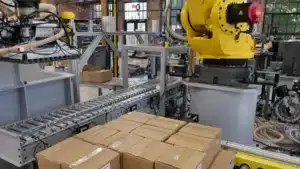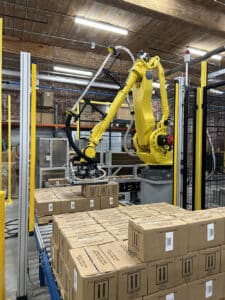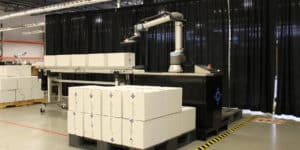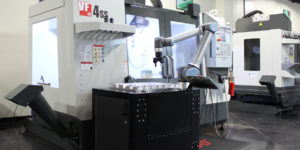Automation Glossary: Palletizer
What Is A Palletizer?
A palletizer is a robotic machine that efficiently stacks products onto pallets for storage and transport. Palletizers automate the pallet stacking process, maximizing space use, reducing the risk of damage, and increasing production efficiency. Palletizers are widely used in industries such as manufacturing, warehousing, and logistics. There are two primary types: cobot palletizers and industrial palletizers. Cobot palletizers are collaborative robots that work safely alongside humans, making them ideal for smaller, flexible operations. Industrial palletizers, on the other hand, are larger, more powerful machines designed for high-volume production, often integrated with conveyor systems for continuous product handling.
What Are Palletizers Used For?
Cobot Palletizers
- Small-Batch Production: Collaborative palletizing is ideal for applications involving small production runs with a variety of products.
- Frequent Product Adjustments: Cobots are easily reprogrammable to accommodate different product sizes and weights.
- Labor-Intensive Tasks: Cobot palletizers automate repetitive and physically strenuous tasks, minimizing worker fatigue and reducing the risk of injury.
- Seamless Automation Integration: Cobots can be paired with other automation technologies like conveyors and robotic arms to create versatile, streamlined production workflows.
Industrial Palletizers
- High-Volume Production: Designed to efficiently manage large quantities of products, boosting overall production rates.
- Heavy-Duty Capability: Built to handle heavy or oversized items, such as engine blocks or large shipping boxes.
- Continuous Production Flow: Works seamlessly with conveyor systems to maintain a steady, uninterrupted flow of goods.
- Warehousing & Distribution Efficiency: Optimizes palletizing in warehouses and distribution centers, reducing manual labor and improving operational efficiency.

Related Terms
Further Reading








